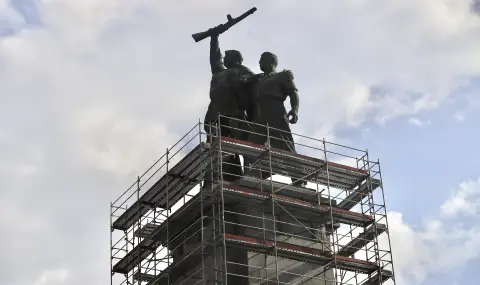Mikhail Marinov, director of the “Belene Island“ Foundation, has a dream. However, it is not related to environmental protection, although the idyllic island on the Danube River is a huge biotope: it is a habitat for almost 500 species of birds, including sea eagles and pelicans, for which the region is famous.
Former concentration camp
The sad fame of this place is connected with something else: from 1949 to 1989, nearly 15,000 people were interned on the island, who in the eyes of the communists were enemies of the regime. Many of them died of hunger and the exhausting forced labor they endured.
Marinov and his civic organization want to preserve the memory of these people: "Our wish is for this place to become part of the European network of memorials and for people not only from Bulgaria to come here," he says. However, even 35 years after the end of the communist dictatorship, the road to the "Belene" camp is still long and difficult. To get there, you first have to cross the Danube on a pontoon bridge, then drive 10 kilometers along a narrow road riddled with potholes.
"We want to restore the entire infrastructure of the camp - the way it was in the 1950s," says Marinov. This includes the former wooden barracks for prisoners, of which there are no photos. Fortunately, drawings made secretly by a former prisoner can be used for the reconstruction.
Almost nothing is happening at the state level
However, it will be many years before the ideas of the “Belene Island“ Foundation become reality. Marinov has no illusions about this. Luiza Slavkova from the “Sofia Platform“ Foundation, which also works to better understand the past, agrees with him. “Practically nothing is happening at the state level,“ she tells DV.
Although communism was officially condemned as a criminal regime, no efforts were made in the country to benefit the victims. “In Bulgaria, there are still no state-funded studies of communism and its consequences“. Unfortunately, there is no museum dedicated to the history of the dictatorship in Bulgaria, Slavkova adds.
“As a result, the topic of the memory of the victims is completely absent from the public debate“. To change this, “Sofia Platform“ is committed to measures in the field of education. There is a lot to catch up on there, since until 2018, Bulgaria's recent past was not included in textbooks.
In families, the dictatorship is not talked about enough
In personal contacts between people, silence on this topic was also maintained for a long time. A study by “Sofia Platform“ from 2014 showed that parents hardly talk to their children about the dictatorship. Nevertheless, political scientist Slavkova is hopeful, since communism is no longer a taboo topic in school. A current study by “Sofia Platform” shows that young people already know more, she emphasizes. Her civic organization also works to raise awareness among young people and relies on modern formats for teaching history.
One of the foundation's leading projects involves eyewitness accounts: in several-hour interviews, survivors of the Belene concentration camp talk about their daily life in the camp: about forced labor, hunger, torture, and about the despair and hope among the prisoners. The recordings are available online at "belene.camp" - including translations into English and German for an international audience.
Against Silence with the Help of Literature
As a whole, Bulgarian society is still silent on very sensitive issues, continues Slavkova, who hopes that the academic world and culture will give additional impetus to understanding the communist past. In this regard, she mentions the writer Georgi Gospodinov, who won the British Booker Prize in 2023 for his novel "Time Shelter".
"Personal history cannot be separated from the big story", says the author. He adds that during the communist dictatorship in Bulgaria there were no major resistance movements – unlike the popular uprisings in other countries: the GDR (1953), Hungary (1956), Czechoslovakia (1968) and Poland (1980).
The Communists became socialists
“We missed important years“, Gospodinov went on to say, referring to the widespread passivity of the people in Bulgaria and the fact that Bulgaria had neither a peaceful nor a bloody revolution – a fact that helped the communists to derive maximum benefits from the changes in Eastern Europe.
After the end of Zhivkov's regime on November 10, 1989, the Bulgarian Communist Party changed its name to the Bulgarian Socialist Party (BSP), but managed to win an absolute majority in the first democratic elections in October 1990. For comparison: in a united Germany, the former communists received 2.4% in the elections in December of the same year.
In Bulgaria, they did not know what to do with the new freedom
Georgi Gospodinov has only one explanation for the success of the old elites shortly after the end of the dictatorship: “We did not know how to protest. Nobody had taught us how to be free“.
35 years have passed since then.
Author: Marcel Fürstenau
